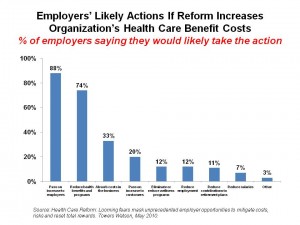The most important goals for health reform among mid size to large U.S. employers are to contain health care costs, encourage healthier lifestyles among employees, and improve quality of health care. However, very few employers believe health reform will accomplish those objectives.
Towers Watson surveyed American employers’ perspectives on the Patient Protection and Affordable Care Act (PPACA) now that they’ve had a chance to digest the legislation. The one certainty employers share is that health reform will lead to higher health costs. 9 in 10 employers believe that reform will increase health benefit costs.
And while 96 percent of employers cite “containing health care costs” as the #1 objective for health reform, only 14 percent believe PPACA will accomplish that goal.
The chart illustrates the likely actions employers will take ‘if’ health costs increase post-PPACA implementation. The top two most likely responses are (1) to pass cost increases on to employees in the form of higher premium contributions; and, (2) to reduce health benefits and programs, from changing plan options, to restricting eligibility and increasing deductibles.
Towers Watson polled 661 mid size to large employers in May 2010 for this survey.
Health Populi’s Hot Points: Towers Watson concludes that the post-PPACA world is a golden opportunity for employers to “reshape their deal with employees and their total rewards package overall.” To focus solely on costs, allocating more to workers without artfully re-imagining the end-game objectives of total compensation, could lead directly to dumb fiscal decisions on the part of workers. These actions include postponing health care visits to physicians to avoid co-pays, not filling prescriptions due to co-pays, postponing necessary medical tests, and opting out of buying into the health plan entirely.
The opportunity is to imagine whole-health: that workers’ lives happen at work, but also at home and on-the-go. Insured employees need tools and information that help them manage health 24×7. This starts with education, but not in the yawn-generating, lethargic way it’s been done by HR departments throughout the nation. Who will disrupt the health plan space with engaging, relevant health plans that understand how people actually live? Who will provide tools for mobile health, self-care, home monitoring, within the benefit? Who can deliver plans and services that respond to health citizens’ demands for how they want to consume their own care? There’s the opportunity for personalized health care that is customized, connected, collaborative. If employees are going to pay more, which they surely will — then they should get the kind of care they demand. Whether the supply side of health plans can respond to this demand remains to be seen. If the current crop can’t, disruptors will fill the void.
This post originally published over at Health Populi

 By
By 















